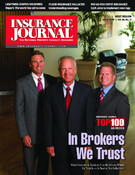Price at the Gas Pump Spurring Assembly Bill, DOI Regulation
California’s Department of Insurance as well as state legislators are considering bringing pay-as-you-drive automobile insurance to the state, a system in which automobile insurance premiums would more accurately reflect how far motorists drive each year.
Assembly Bill 2800, sponsored by Jared Huffman, D-San Raphael, would allow insurers to apply different rating factors for voluntary insurance-verified annual mileage and applicant-estimated annual mileage.
Insurers generally support the bill. According to the Personal Insurance Federation of California, which represents insurers who write approximately 50 percent of the auto insurance sold in the state, the bill “addresses the dual goals of emission reductions through incentives and ensuring fairness in automobile rates as required under current law … AB 2800 would ensure true mileage verification and allow low-mileage, low-polluting drivers to pay less for auto insurance.”
PIFC represents State Farm, Farmers, Safeco, aigdirect.com, Progressive and the National Association of Mutual Insurance Companies.
Despite insurers’ support, consumer advocacy groups are concerned that the bill would lead to unfairly discriminatory rating.
“Unfortunately, the bill will not serve the objective of enhancing incentives for policyholders to drive less, because it improperly amends a voter-approved initiative [Proposition 103] and will … be rejected by the courts,” according to Consumer Action. The group also said the bill would raise privacy concerns by allowing global positioning systems (GPS) to collect and verify mileage.
“This form of monitoring mileage totals is unacceptable and unnecessary, as the current methods of collecting mileage figures are sufficient to provide insurers what they need to determine rates and stay within the provisions of Proposition 103,” the group said.
Meanwhile, the Department of Insurance is pursuing its own form of PAYD regulations, which it said would make AB 2800 unnecessary. Following a public hearing on the issue held on June 23, 2008, the DOI indicated it was working to propose regulations in the next six to eight weeks, or by mid-August 2008.
According to the DOI, California Insurance Code under Prop 103 already requires auto rates to be based on three mandatory factors in decreasing order of importance, with the second mandatory factor as “the number of miles [the insured] drives annually.” Under the current regulations, the annual mileage factor is defined as an estimate of the number of miles an insured vehicle will be driven in the next year.
The regulations specify how the mileage estimate may be determined. However, insurers establish their own mileage rating brackets for rating purposes.
Mileage rating brackets vary significantly from carrier to carrier, but DOI said no major insurer in California offers an option that adjusts the price of auto insurance based on the exact number of miles the insured actually drives. Consequently, the Department intends to adopt regulations with the goal of making PAYD insurance widely available in California and to encourage participation.
“A major motivation behind the Commissioner’s push to make [PAYD a type of coverage] available [to consumers] is to encourage Californians to drive less, reducing the environmental strain of carbon emissions that result from driving,” stated Molly DeFrank, deputy press secretary for the Office of Insurance Commissioner. “In addition, Commissioner Poizner is committed to making sure that consumer pay rates that accurately reflect their coverage. Pay-as-you-drive is a great way for consumers to more accurately pay for the coverage they need.”
Eric J. Weibel, president of Alta Financial & Insurance Services LLC, attended the hearing and is a supporter of PAYD regulations. Yet he said there are challenges to implementing them.
Weibel noted that part of the DOI hearing discussion centered on how mileage would be audited. He said insurance companies, environmental groups, transportation companies, conservation groups, academics, technology vendors and consumer advocacy groups testified at the hearing.
One idea that was proposed to verify mileage was for companies that conduct smog checks to also certify odometer readings, he said.
“Mileage is very predictive of loss. If you can verify it, it’s very accurate. But it has to be done carefully,” Weibel said.
The DOI acknowledged that taking into account exact mileage is one option that is being considered in its proposed regulations. “But there is no current regulation like this to refer to, so how mileage would be verified is yet to be determined,” DeFrank stated.
At the hearing, the DOI also sought input on:
- Mileage brackets for PAYD, such as pay per 10 miles or 100 miles;
- Appropriate technology, such as GPS or wireless transmission of odometer information;
- Privacy and security issues; and
- PAYD program incentives.
“PAYD is a very good idea, but there is a lot of complexity to it,” Weibel said. “There’s the potential for unintended consequences and consumer dissatisfaction.”
Topics California Carriers Auto Legislation Pollution
Was this article valuable?
Here are more articles you may enjoy.


 Appeals Court Spikes Brett Favre’s Defamation Suit Against Shannon Sharpe
Appeals Court Spikes Brett Favre’s Defamation Suit Against Shannon Sharpe  Study Stirs Debate on Real Impact of Litigation, Fraud on Property Insurance
Study Stirs Debate on Real Impact of Litigation, Fraud on Property Insurance  D&O Market in ‘State of Transition’ on Litigation Trends: Woodruff Sawyer
D&O Market in ‘State of Transition’ on Litigation Trends: Woodruff Sawyer  State Farm: Catalytic Converter Thefts Drop 74%
State Farm: Catalytic Converter Thefts Drop 74% 


